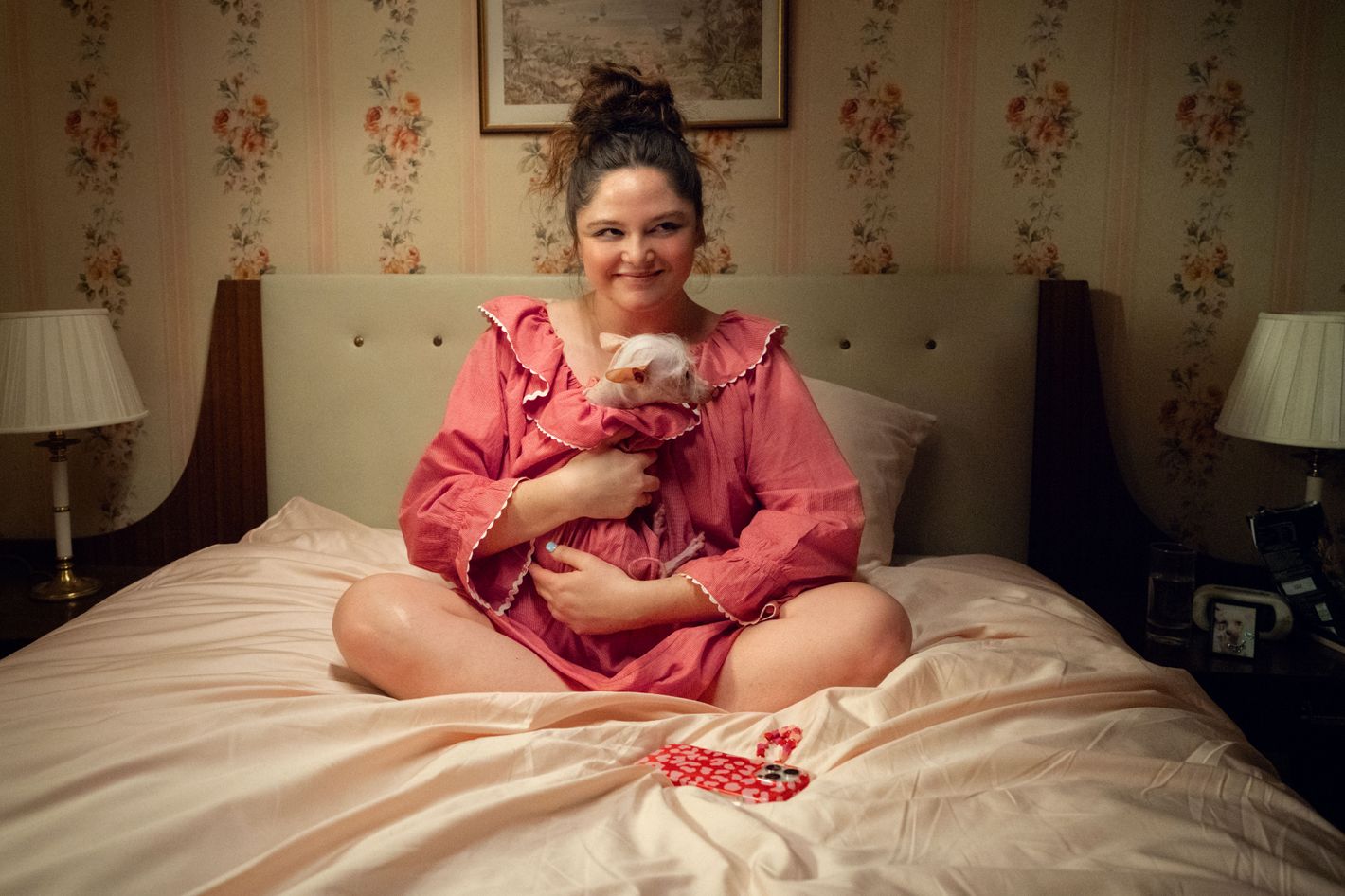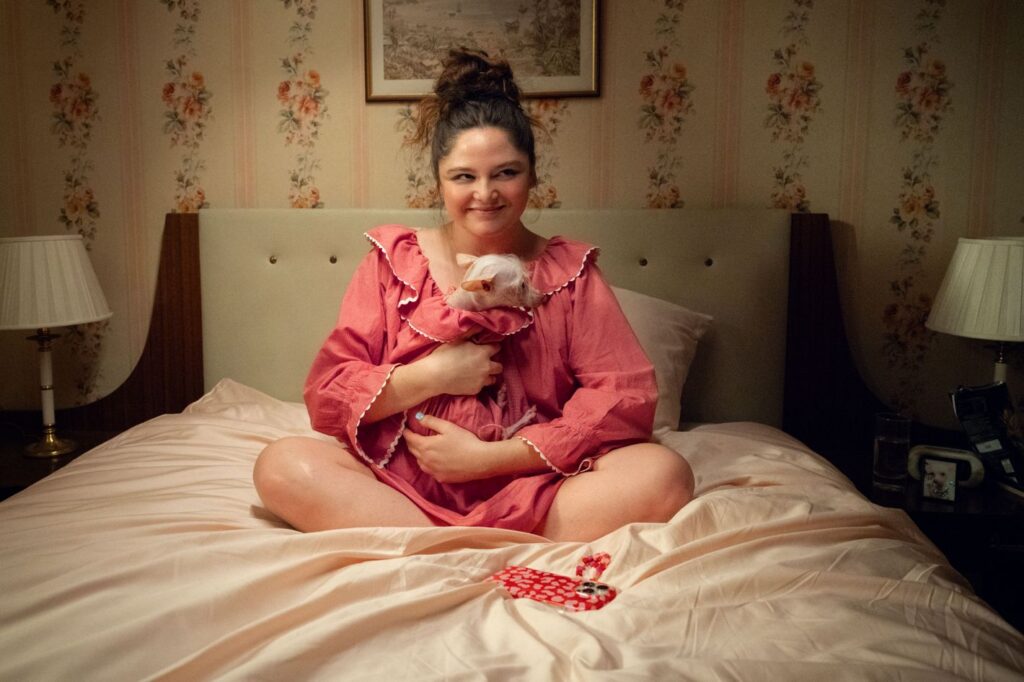
The plot of many a corseted period drama on which Jessica, the main character and narrator of Lena Dunham’s new Netflix series Too Much, has built her image of England goes something like this: An ingénue finds herself in a new environment, where she — clumsily, unpreparedly, authentically — falls in love with a distinguished gentleman who loves her back despite her “poor connections” and her faults. Often, this story is set on a picturesque estate, somewhere huge and stately with plenty of corners perfect for running into your prospective lover. This is how it goes for Elizabeth Bennet and Mr. Darcy; it’s how it goes for Jane Eyre and Mr. Rochester. The stories of their romance have endured over centuries because they are beautifully crafted, yes, but also because, like all romances, they are fantasies. They are stories in which a person’s essence, their inalienable magnetism, can transcend the constraints of society, custom, and ego. Part of what makes Lizzy Bennet so attractive is that Mr. Darcy tries to resist her pull.
Too Much is explicit about its influences: Jessica, who constantly refers to Jane Austen novels, is a foreigner in a new environment, open to being fallen in love with despite her kookiness. She’s jaded enough by her recent breakup to avoid the ingénue label, but because this is a show from Lena Dunham, she is unflinchingly sincere, a quality well-matched to Megan Stalter’s earnestness. When we open on “Nonsense & Sensibility,” Jessica is walking around London considering the world of possibilities drawn from movies, television, and books that have become available to her. A woman in England, she tells Wendy Jones, her ex-boyfriend’s fiancée and the person to whom her narration is addressed, can be anything, whether that’s “a strong-willed police sergeant who uses her trauma to solve grisly crimes,” “a sex worker with a heart of gold,” or “a carefree party girl with her whole life ahead of her.” What’s in store for Jessica to learn (it’s obvious from the start) is that timeless lesson: You take yourself wherever you go.
The pilot is heavy on setup as it works to send Jessica to England, tell us why she’s moving, and establish the flurry of references and archetypes it’s nodding to, from classic British rom-coms like Bridget Jones’s Diary and Notting Hill (both produced, like Too Much, by Working Title Films) to Elizabethan and Victorian novels. To anyone familiar with Lena Dunham’s personal life, which is anyone who follows her in any kind of way, it also establishes the parallels between herself and Jessica: Dunham is now based in London, where she got married after a public breakup with the musician and producer Jack Antonoff, who is in turn now married to the otherworldly beautiful actress Margaret Qualley. But such is the nature of pilots, especially at 30 minutes of runtime: A lot is crammed in at a pace that can sometimes suffocate character.
I’m going to avoid this comparison as much as I can, because they are entirely different shows, but the beauty of the Girls pilot — Dunham’s televisual masterpiece of the mid-2010s — is that it bombarded you with character. There is a graininess to that episode that is smoothed down here by Netflix’s signature sleekness. Because Girls was so much its own thing, and because its influences were of the kind more driven by character than plot (Sex and the City; the films of Woody Allen; stuff like Claudia Weill’s 1978 film Girlfriends and Nicole Holofcener’s 1996 film Walking and Talking), it allowed for character development to be the main driver of story. Megan Stalter’s challenge here is to come off more like herself and less like an imitation of Dunham, to resist the impulse to do Hannah Horvath in London.
All of that said, how does Jessica find herself in London in the throes of her breakup with “Zev Jeremiah Goldstein,” who dumped her because he “wasn’t ready to be a husband and a father” and then got quickly engaged to Wendy Jones, a social-media influencer played by — this is important — Emily Ratajkowski? A month before she ships off to London, a drunken Jessica breaks into Zev’s apartment — he changed the locks on her — by shattering a window with a garden gnome, then bursts into their room to demand an explanation for what they did to her. “I want to hold space for how you’re feeling … but it’s giving crazy,” Wendy says, nicely, annoyingly, while Zev hyperventilates.
Since breaking up, Jessica has moved back to Long Island with her fitness-obsessed mother (the always-excellent Rita Wilson); grandmother (Rhea Perlman); recently divorced sister, Nora (Dunham); and nephew, whose quippy eccentricity feels like a continuation of the women’s. Jessica calls her family home a “Grey Gardens hell of single women,” though the dynamic between them is warm and charming, with all of the Edies’ witticisms and little of their tragedy. These are unique, funny women, the kind you’d want to drink wine with, but who always end up going home alone at the end of the night. Though Jess harbored the ambition to be a “great film director” with “something to say about the female experience,” she ended up in the producer’s chair, where she’s been for over 15 years.
But she’s a good producer: Shooting a commercial for her company, Jessica Alba (playing herself) wants her to be in charge of the shoot instead of the arrogant male director who ignores her insights. But when Alba asks her to take over, Jess freezes — she can’t rise to the occasion of someone important telling her she’s capable. It’s when she’s unwinding in the hallways that her boss, Nora’s ex-husband (Andrew Rannells), pulls her aside. He tells Jessica that she hasn’t been the same since the breakup and offers her a job shooting a Christmas commercial for three months in London, where she might have a chance to find herself again or even be someone new. Besides, she’s always been obsessed with England. “You love movies where women fan themselves and die of tuberculosis and shit,” he pleads.
So, when she arrives, that’s what Jess expects — “Merchant Ivory–type shit,” an estate where she might fan herself and be attended to by a charming cast of neighbors and employees. Instead, she finds herself housed at Hoxton Grove Estate, an apartment building with thin walls and profane tenants, and attended to by Gaz, a strange but sweet neighbor. Jessica uses all of her strength to pull herself out of the self-pitying vortex that engulfs her when, scrolling through Wendy’s Instagram, she sees that Zev proposed to her by putting a ring on a lizard. Bravely, Jess puts on an outfit and takes herself to the “pub.”
This is when her luck starts to turn around. The band “Felix and the Feelers,” led by the titular Felix, a nail-polished, lipsticked, and excellent Will Sharpe, plays a moody, grungy tune before their meet-cute in the bathroom. Jessica tosses him a “bog roll” — that’s toilet paper, for those of us across the pond — over the bathroom stall, shortly before a beautiful woman in a foul mood walks away from him at the bar. Jess and Felix meet again outside, as she’s “trying to call an Uber” (in an English-speaking country, with an app that’s set up in English. What could be so hard?!), and he offers to walk her home. Jess and Felix have instant chemistry. He’s charming and funny in that dry British way, and his openness gives Jess, already an over-sharer, immediate reason to open up about her breakup.
But when they get to her “flat” and Jess kisses him, Felix doesn’t kiss her back — he’s been “seeing someone,” and he’s trying to do things differently this time, a hint for us to watch out for. Jess is smart enough to pick up on it, and, mortified by her attempt at making out, she walks him to the door and refuses to exchange numbers. But Felix is struck by Jess: She told him that Fiona Apple’s Tidal was the first CD she ever owned, so he plays “Slow Like Honey” on the walk home and decides to turn back. Meanwhile, Jess is making a front-facing-camera video addressed to Wendy. “The fire of my passion cannot be extinguished,” she seethes, holding a candle under her chin. As she becomes more enrapt in her own performance, she drops the candle, setting the front of her Elizabethan-style nightgown on fire and unleashing a crisis.
Jessica calls the NHS and paramedics put her under the cold water of the shower to ease the burn. Gaz is there to offer some well-intentioned support, but his presence is made obsolete by Felix’s return. “By God, Wendy,” she narrates, “there he was. My Mr. Darcy. My Rochester. My … Felix.” It’s already obvious that Felix doesn’t have any of Mr. Darcy’s or Rochester’s fortunes, nor their arrogant attitudes. But the comparison suggests that Felix will have secrets and that this rom-com will build toward unwelcome revelation. Telling Felix about her disappointment with Hoxton Grove Estate, Jessica said she’s “adjusting her expectations.” The best rom-coms derive tension from the fact that such adjustment is antithetical to the development of romance. There’s good chemistry between Stalter and Sharpe, who anchors her kookiness with an even-keeled realism and her open self-consciousness with self-assuredness. I’m already rooting for them, which is how I know at one point or another, my heart is bound to break.
Lena Dunham’s new Netflix series is a send-up of classic British rom-coms like Bridget Jones’s Diary and Notting Hill.

































































